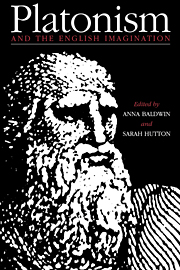Book contents
- Frontmatter
- Contents
- Notes on contributors
- Preface
- I ANTIQUITY
- II THE EARLY CHRISTIAN PERIOD AND THE MIDDLE AGES
- III THE RENAISSANCE AND THE SEVENTEENTH CENTURY
- IV THE EIGHTEENTH CENTURY
- V THE NINETEENTH CENTURY
- 18 Introduction
- 19 Recollection and Recovery: Coleridge's Platonism
- 20 Wordsworth's Ode on the Intimations of Immortality
- 21 Shelley, Plato and the political imagination
- 22 Arnold, Plato, Socrates
- 23 Flux, rest and number: Pater's Plato
- VI THE TWENTIETH CENTURY
- Bibliography
- Index
22 - Arnold, Plato, Socrates
Published online by Cambridge University Press: 15 December 2009
- Frontmatter
- Contents
- Notes on contributors
- Preface
- I ANTIQUITY
- II THE EARLY CHRISTIAN PERIOD AND THE MIDDLE AGES
- III THE RENAISSANCE AND THE SEVENTEENTH CENTURY
- IV THE EIGHTEENTH CENTURY
- V THE NINETEENTH CENTURY
- 18 Introduction
- 19 Recollection and Recovery: Coleridge's Platonism
- 20 Wordsworth's Ode on the Intimations of Immortality
- 21 Shelley, Plato and the political imagination
- 22 Arnold, Plato, Socrates
- 23 Flux, rest and number: Pater's Plato
- VI THE TWENTIETH CENTURY
- Bibliography
- Index
Summary
EARLY WRITINGS
Tracing the evolution of Plato's influence on Matthew Arnold (1822–1886) allows us to see the whole of Arnold's intellectual development more clearly. Plato is a central figure in Arnold's prose work, but up until the age of thirty-five Arnold saw himself as primarily a poet, and here the Platonic influence is minimal. ‘Quiet Work’ contains hints of Plotinus, and ‘In Utrumque Paratus’ explores the Plotinian idea of the world as an emanation from the one all-pure; ‘To Critias’, the dedication of ‘The World and the Quietist’, is probably derived from the Eryxias, and the story of ‘The Scholar-Gipsy’ is taken from the Oxford scholar Glanvill, who was associated with the Cambridge Platonists. Only ‘Self-Deception’, based upon the Myth of Er,shows direct and major Platonic influence, but of that poem Arnold said,‘[It is] not a piece that [at] all satisfies me’ (Poems, P. 292).
Arnold at this period was not ignorant of Plato. His diaries from the years 1845–7 have survived and show him to have read – in Greek – the Republic and Phaedrus, together with five early works, the Menexenus, Lysis, Greater Hippias, Lesser Hippias, and Ion. As Arnold's first volume of poetry appeared in 1849, there should have been plenty of time for the Platonic influence to filter through to his verse. The fact that it did not, suggests that Arnold's imaginative preoccupations at the time could not make use of Plato, and if we consider the philosophical outlook of his poetry it is not difficult to see why.
- Type
- Chapter
- Information
- Platonism and the English Imagination , pp. 242 - 256Publisher: Cambridge University PressPrint publication year: 1994



